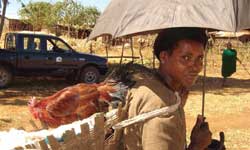



Project Set up to Reduce Disease in Ethiopian Villages
GLOBAL - Institutes belonging to the UK's Biotechnology and Biological Sciences Research Council (BBSRC) are to work on a joint project with local partners to reduce poultry diseases in Ethiopia.Poultry play an important economic, nutritional and socio-cultural role in the livelihoods of poor rural households in many developing countries, including Ethiopia, where they are an integrated part of the smallholder production systems and play a significant role in poverty alleviation. Purchase and rearing of poultry is often seen as the first step out of poverty. Women tend to own and manage chickens which often provides them with their only independent source of cash income.

Photo: Tadelle Dessie
Indigenous chicken varieties are well adapted to local environments but tend to grow slowly and produce fewer and smaller eggs compared to commercial stocks. Breeding programmes using local varieties of chicken suggest that low cost and relatively low input improvement in productivity might be possible while keeping the local adaptive traits such as heat tolerance and disease resistance.
Researchers from the UK and Ethiopia will look at identifying the causes of infectious diseases which have a major impact on poultry production in Ethiopia and will link this with an ongoing poultry breeding programme in the country to improve resistance to these priority infectious diseases whilst enhancing productivity and production.
Knowledge from this study will also enable more precise disease control planning by Ethiopian policy makers and animal health professionals and will also provide a legacy of improved scientific capacity within Ethiopia, including training of local scientists and enhanced laboratory facilities for poultry testing.
Collaborations on this project are University of Liverpool; Roslin Institute, University of Edinburgh; University of Nottingham; Ethiopian Institute for Agricultural Research and the International Livestock Research Institute, Ethiopia.











